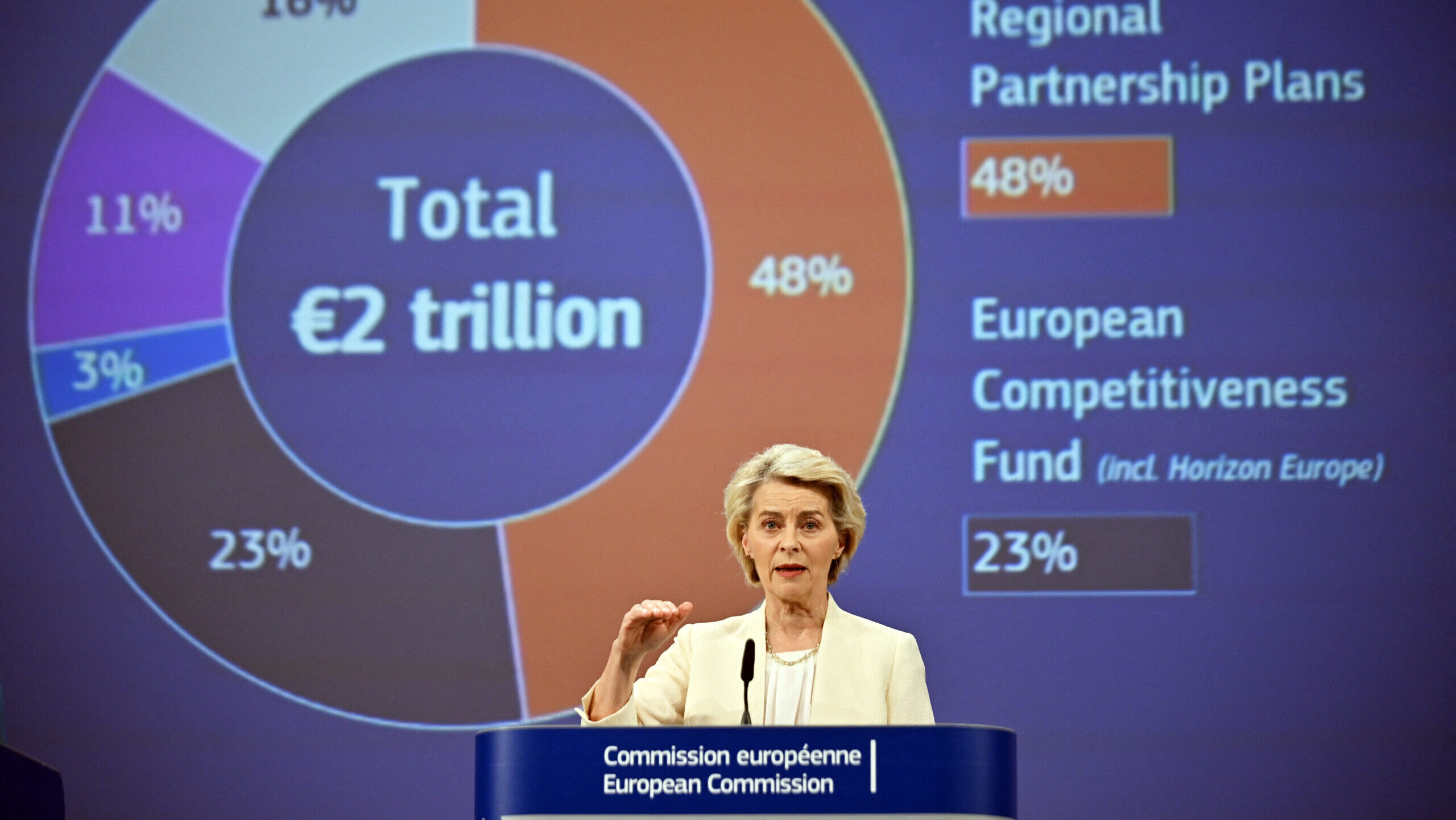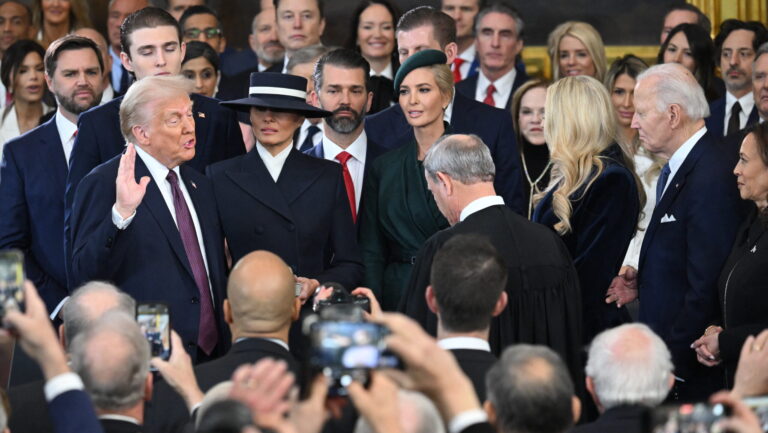‘As long as I am Prime Minister, I will not vote for this [the EU budget proposal], because it would be like putting our country under the guillotine,’ Hungarian Prime Minister Viktor Orbán stressed firmly during an interview with Ultrahang last week. European Commission President Ursula von der Leyen presented Brussels’ proposal for the common budget of the European Union for the period of 2028–2034 on 16 July—and member states were not unanimously satisfied with it, to put it mildly.
‘It is a budget that matches Europe’s ambition, that confronts Europe’s challenges, and that strengthens our independence,’ von der Leyen emphasized while presenting the proposed budget. Amounting to almost 2 trillion EUR, the Multiannual Financial Framework (MFF) represents roughly 1.26 per cent of EU Gross National Income (GNI)—up from the current 1.13 per cent, marking a 60 per cent increase in real terms compared to the current MFF. While introducing several new measures to allocate its ‘own resources’ rather than relying on additional funding from member states, a huge part of the proposed MFF would still be made up of national contributions—already a significant point of contention between member states and Brussels. Moreover, von der Leyen’s plan was kept entirely secret until the announcement, adding to the already intense accusations of a lack of transparency at the highest level of the EU executive. The proposed budget also sparked severe infighting within the Commission, as reported by the Financial Times. Altogether, more than ten member states criticized different parts of the MFF. According to Orbán, it would not survive the end of 2025 in its current form.
A ‘Ukraine Budget’
Now take a look at the actual proposals. From the nearly 2 trillion EUR, 100 billion would go to various forms of support for Ukraine. This represents a watershed moment, as no non-EU country has ever received such a significant share of the common budget in the history of the EU. According to the original statement, the 100 billion would primarily support Ukraine’s reconstruction and its accession to the European Union—a process currently blocked by Hungary’s veto. It is part of a broader external package called the ‘Global Europe Instrument’, totalling 200 billion EUR to promote Brussels’ foreign agenda. It also includes a 15 billion EUR crisis reserve and 3.4 billion EUR for the Common Foreign and Security Policy.
Looking at the figures, Prime Minister Orbán aptly described the budget as a ‘Ukraine budget’, as the funding proposed for the candidate country comprises around 20 per cent of the entire MFF. Another 10–11 per cent would go towards paying interest on previous EU loans, meaning that roughly one-third of the budget already involves funding leaving the EU’s financial system. Ultimately, someone has to bear the cost, and when money is at stake, the majority of member states—rightfully—look to their own interests.
Therefore, beyond Hungary’s usual opposition to accumulating financial burdens in favour of Ukraine and at the expense of member states, other countries have also criticized the size of the Ukraine allocation. The Netherlands, Sweden, and Germany each voiced objections, stating that the current proposal prioritizes Ukraine more than the member states. This marks a significant shift, as these countries are among the most prominent supporters of Kyiv’s self-defence against Russia and of Ukraine’s fast-tracked accession to the EU. This means that, after a long period of opposition to the EU majority, Hungary now has allies in resisting the channelling of an unreasonable amount of funding to Ukraine. German Chancellor Friedrich Merz even stated that Ukraine’s accession to the EU is unrealistic before 2034—contradicting the Commission’s position—thus such a large allocation should not burden the next budget.
New EU-Level Taxes
To finance the unprecedentedly large budget, the Commission seeks to generate its own revenues. The proposal introduces five new EU-level revenue streams, totalling approximately €58 billion annually: the Emissions Trading System (ETS; around €9.6 billion), the Carbon Border Adjustment Mechanism (CBAM; around €1.4 billion), tobacco excise duties (around €11.2 billion), a non-collected e-waste levy (around €15 billion), and a new tax on large companies—the Corporate Resource for Europe (CORE; around €6.8 billion).
The latter has become a central focus of criticism among member states. CORE is a lump-sum turnover tax on companies with over €100 million in net turnover—not in profit—applying to EU-resident companies and EU-based establishments. Critics argue that CORE places an immense burden on marginal firms, as it is not based on profit, thereby distorting competition. Leading financial think tank the Tax Foundation labelled CORE a ‘strange’ and poorly designed tax, advocating instead for a profit-based EU tax. The traditionally fiscally conservative member states—Germany, the Netherlands, Sweden, Austria, and Finland—all voiced criticism of CORE, stating that it would deter investment and damage European competitiveness disproportionately to the revenue it would generate. While no Hungarian official has yet responded directly to CORE, the Orbán government has consistently opposed every EU-level corporate tax, claiming that such initiatives undermine sovereignty and go against Hungary’s low-tax regime.
A Declaration of War Against Farmers
The Commission has significantly reduced funding for Cohesion, Agriculture, and Social Policy in the proposal, allocating around 865 billion EUR merged into a single National/Regional Partnership Plan. One of the biggest losers of the proposed budget is the agricultural sector. The Common Agricultural Policy (CAP)—which would be phased out according to the proposal—would see an €86 billion reduction compared to the current MFF, with analysts estimating 20–30 per cent cuts relative to inflation-adjusted current levels.
This is likely the most controversial part of the proposal, as evidenced by opposition from more than 20 member states and most of the EU’s agricultural organizations. Farmers’ group Copa-Cogeca argued that the cuts threaten rural livelihoods and called the proposal a ‘declaration of war’ against European farmers. Central and Eastern European member states—including Hungary—have already announced joint efforts to defend CAP and scrap the proposed cuts. Agriculture Commissioner Christophe Hansen warned that diverting CAP funds to defence weakens food security. The proposed measures have also drawn criticism from environmentalists, who argue that biodiversity and climate initiatives would be weakened compared to the current MFF.
The European Commission would allocate around 410 billion EUR to Competitiveness, Research, and Defence, quintupling current common defence spending—a move praised by most member states. However, critics point to serious limitations: the proposed budget is too small to close investment gaps; defence spending lacks efficiency without industrial integration; and reliance on debt introduces political and economic risks. The latter is also opposed by Hungary, with the national parliament having already passed a resolution against joint EU borrowing for defence purposes.
Institutionalized Blackmail
Under the new proposal, the entire EU funding structure would be reformed, with member states required to submit action plans to access allocations from the three pillars—mirroring the model used for the COVID-19 recovery fund. By restructuring the system, Brussels would gain considerable leverage in determining which member states receive funding, moving towards an increasingly centralized EU—a development strongly opposed by several member states, including Hungary.
Furthermore, the proposed MFF would strengthen the so-called rule-of-law conditionality mechanism, which would apply across all key pillars. Introduced in 2020, the mechanism allows the Commission to freeze or suspend payments if a member state is deemed to be ‘violating EU foundational values’.
‘If the rule-of-law conditionality regulation were to be applied systematically…Hungary could, in theory, be deprived of all EU funding’
Currently, only Hungary faces disadvantages under this mechanism, with billions of euros in funds suspended by Brussels due to alleged breaches of EU values. The Hungarian government claims the mechanism is a political and financial tool of blackmail, wielded by the Commission to punish member states with dissenting views on key issues such as migration, the war in Ukraine, or the promotion of ‘woke’ ideology. If the rule-of-law conditionality regulation were to be applied systematically in the new budgetary period, Hungary could, in theory, be deprived of all EU funding.
The proposal now enters the negotiation phase, starting at the level of the Council of the European Union. For the budget to be approved, both the European Parliament and the European Council must vote in favour—by absolute majority in the Parliament and unanimously in the Council. The current proposal is unacceptable to all stakeholders: the European Parliament has already indicated that, in its current form, the budget will not pass, and every member state has expressed criticism of at least some parts of the proposal. The new budget is scheduled to enter into force in January 2028.
Related articles:







